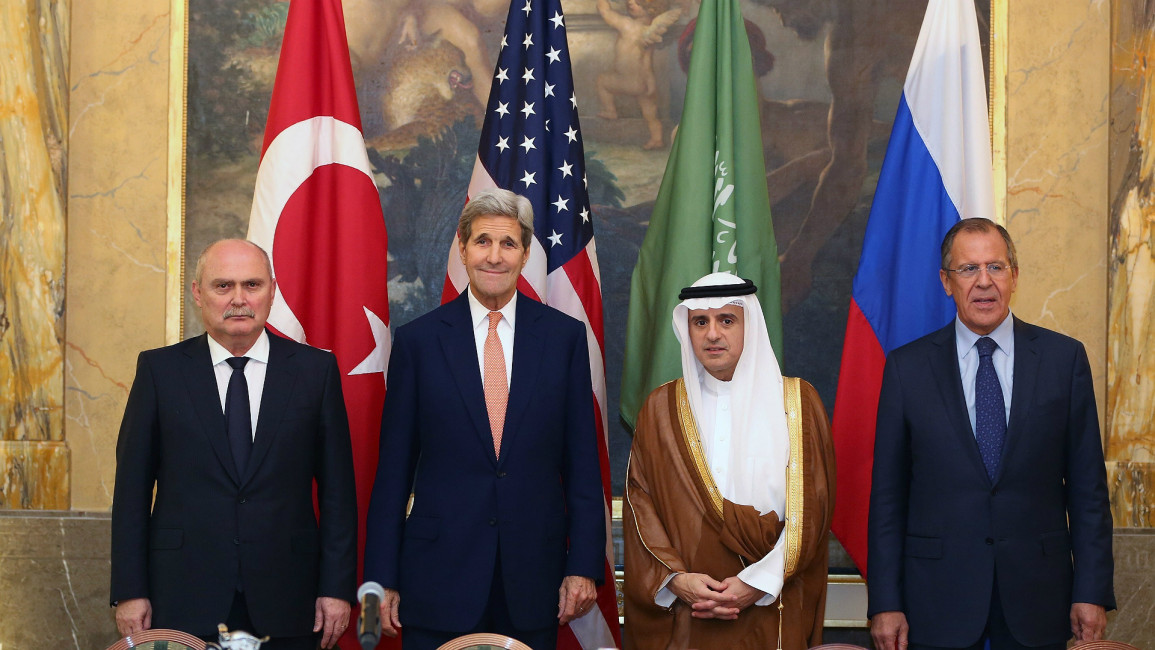Russia, US, Turkey and Saudi Arabia start Syria talks
The top diplomats of Russia, Saudi Arabia, Turkey and the United States started key talks on Friday in Vienna to try to find a way to end the Syrian conflict.
Russian Foreign Minister Sergei Lavrov - whose government backs Damascus - was meeting US Secretary of State John Kerry along with the foreign ministers of Turkey and Saudi Arabia, who all support Syrian rebel groups fighting President Bashar al-Assad.
The crunch talks are part of a diplomatic flurry aimed at stopping the conflict in Syria, which has cost more than 250,000 lives over the past four and a half years.
Washington, Riyadh and Ankara are looking to sound out Lavrov after the embattled Syrian strongman made a surprise visit to Moscow to meet President Vladimir Putin this week.
On September 30 Russia launched a bombing campaign in Syria, which has shifted the dynamics of the brutal four-and-a-half year war - allowing Assad's battle-weary forces to go on the offensive and overshadowing a US-led coalition bombing the Islamic State [IS] group.
The US and its regional allies have decried Russia's strikes, insisting Moscow is not focusing on IS as it claims, but other groups fighting the regime in Damascus, and that the Kremlin's intervention will only prolong the bloodshed.
Meanwhile, Russia and Jordan agreed to "coordinate" military operations in Syria, Lavrov said on Friday after meeting his Jordanian counterpart in Vienna.
"The armed forces of the two countries, the Russian and Jordanian forces, agreed to coordinate their actions, including those of their air forces over Syria," Lavrov told journalists, adding that a "mechanism" had been set up in the Jordanian capital.
Assad's fate
Assad's fate remains a major stumbling block and, after years of failure to stop the bloodshed in Syria, there was scant hope of any major breakthrough.
Washington and its regional allies have long insisted Assad has to go for there to be any chance of a political solution to fighting, but Moscow says it must first help him defeat the IS and other "terrorists" before talks can start on any reforms.
"The aim of the US is to get rid of Assad, probably that is so, our aim is to defeat terrorism, to battle terror, and to help President Assad claim victory over terror," Putin said Thursday in the Black Sea resort of Sochi.
"In this way, we can then create the conditions for the start and, I hope the successful reaching of a conclusion, of the political process to find a settlement."
Kerry said in Berlin that while all sides agreed on the need to find a political solution and battle IS only "one thing stands in the way... a person called Assad - Bashar al-Assad".
Assad's surprise visit to Moscow on Tuesday - his first known trip abroad since the start of the Syrian conflict in 2011 - has now placed the Kremlin as the key link to the strongman.
Putin - who has been isolated by the West for some 15 months over the Ukraine crisis - went on a diplomatic blitz in the wake of the visit by Moscow's long-standing ally, calling the leaders of Saudi Arabia, Turkey, Jordan and Egypt.
While all sides seem entrenched in their positions, analysts say some Assad opponents appear to be softening their line and conceding that he could remain in power temporarily, while Moscow does not seem wedded to the strongman long-term.
Russia has been frantically trying to get the US and its coalition partners to cooperate with its bombing campaign in Syria and Putin on Thursday stressed the need for "joint work" to defeat "terrorism" in Syria.
Before flying to Vienna Lavrov said that it was possible he would meet representatives from other regional players for parallel talks while in the Austrian capital, presumably among them Iran.
|
Countries involved in Syria's war The regime's allies Russia, whose only Mediterranean military base is in Tartus on the Syrian coast, says it is fighting "terrorists", referring to all of Assad's opponents. But the West accuses it of primarily targeting moderate rebels rather than the Islamic State [IS] group. Russian President Vladimir Putin pledged Tuesday to continue supporting Damascus militarily, while calling for a "political solution" involving all groups to end the war. Iran does not officially acknowledge sending fighters to Syria, instead deploying members of its elite Revolutionary Guards as advisers. There are claims that they have been leading fighters from Afghanistan and Lebanon's Shia movement Hizballah, which Tehran denies. According to a US official, at least 2,000 Iranian and Iran-backed fighters are bolstering Syrian army offensives on the ground in the country's north. Tehran has not been invited to attend the Vienna meeting. |
|



